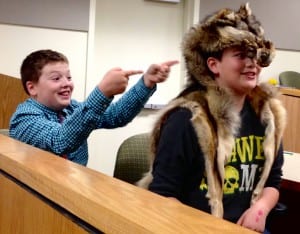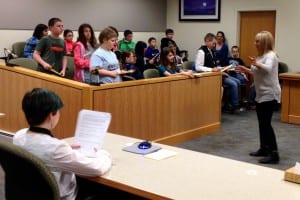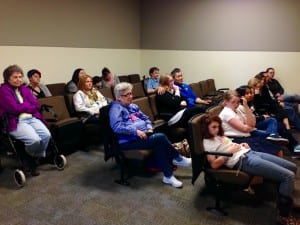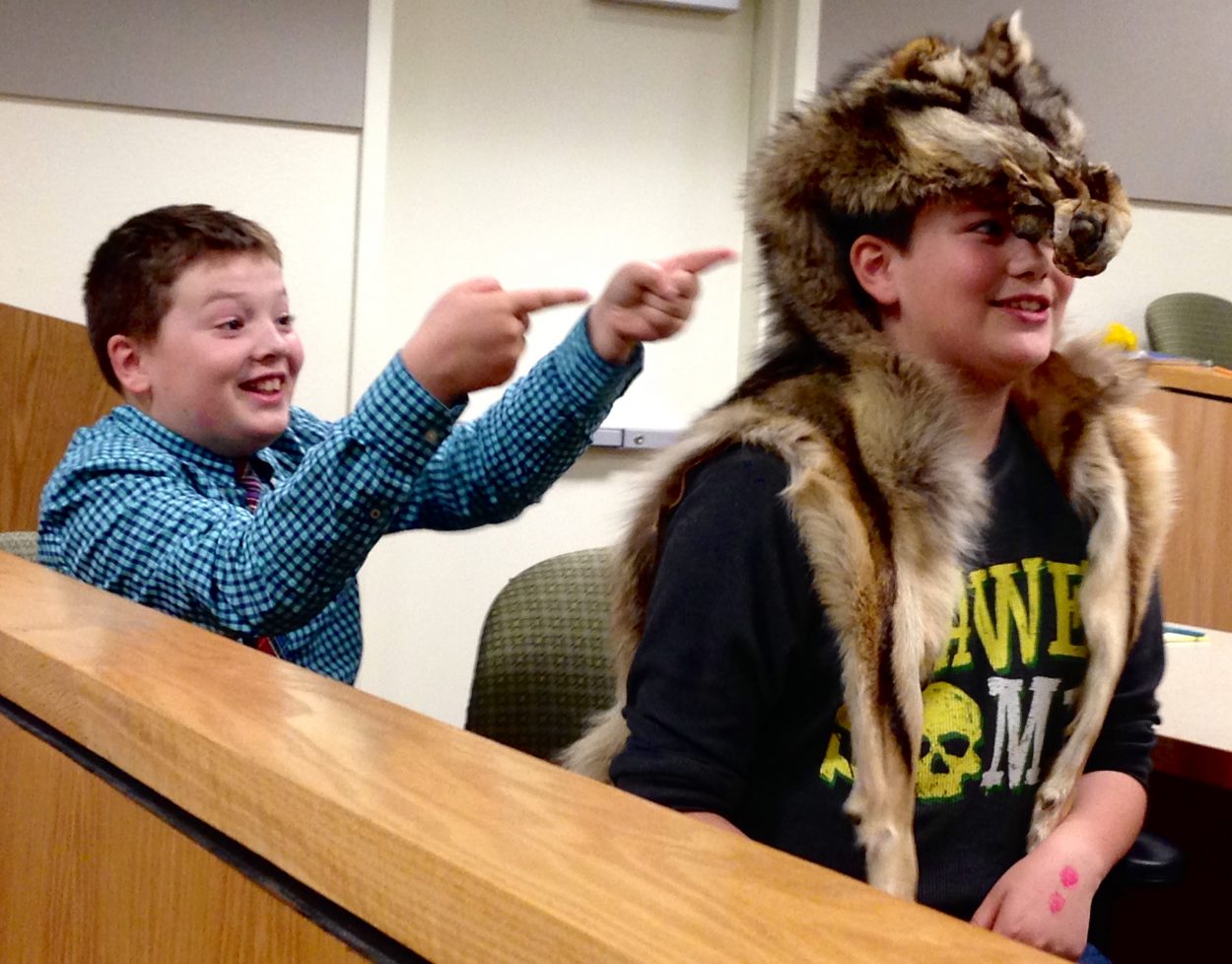
Jack Engell (left) plays the part of defense attorney defending Devon Guthrie (Wolf). Photo/Angela Denning
Students file into the courtroom for a mock trial. One of them is decked out in a wolf costume. A real wolf pelt hangs over the top of his head. The wolf is the one on trial.
Magistrate Judge Desi Burrell preps the students before the trial begins.
Burrell: “Does anybody know what guilt or innocence is? Okay, what’s guilt?”
Kid: “Um, guilt is when the defendant goes to jail or he’s guilty of a crime.”
Burrell: “So you found that beyond a responsible doubt that the wolf did something. So if innocent, if you find him innocent, if all you agree and say the wolf didn’t do it. What would innocent be?”
Student: “That he’s free to go.”
Burrell: “Uh-huh, yeah.”
The students are following a script of a court room proceeding. Some have memorized their lines. Basically, the story goes that the defendant “wolf” is being accused of deliberately causing the death of his neighbors—two pigs–just so he could eat them for dinner. The third pig, their brother, was one of the witnesses.
Prosecution: “What happened when the wolf came to your house?”
Pig: “He looked so mean and sneaky, you know how those wolves are. You remember Little Red Riding Hood and the Gingerbread man don’t you? Anyways, I called the police as soon as I saw him. I knew he was up to no good.”
But the plot thickens when the defense argues that wolf was just looking for sugar to bake his grandmother a cake, like he does every year. He didn’t have sugar so he went to his neighbor’s house.

Magistrate Desi Burrell preps the 5th grade students for the mock trial in the Petersburg Courthouse. Photo/Angela Denning
Some of the witnesses helped corroborate the idea like the wolf’s Granny.
Granny: “My grandson is the best grandson in the world and even with those terrible colds he gets he has still managed to bake me a birthday cake every year for the past 20 years.”
Defense: “So it is your testimony that you believe that Mr. Wolf was planning to bake a cake that day?”
Granny: “Of course! It was my 65th birthday. He would never forget that.”
Other witnesses include the officer who arrested wolf. She says when she searched wolf’s house she found all the ingredients for baking a cake except sugar. The local grocer testifies that wolf had come in to buy sugar but the store had run out. Another neighbor, Goat, says that Wolf had come to her house looking for sugar. She notes that Wolf had a bad cold and was sneezing.
Wolf himself takes the stand saying when he went to the first pig’s house looking for sugar he sneezed.
Wolf: “The house is made out of straw, so when one of my big sneezes came along it blew the whole house down. It all happened so fast I felt terrible. When I saw the pig was dead, I couldn’t waste a good pork dinner.”
So, he ate the pig. Then the same thing happened at Pig Two’s house.
The prosecution argues that Wolf just wanted a free pig dinner and planned the whole scheme. The defense argues that Wolf was the victim of unfortunate circumstances and didn’t intend to break the law.

Students, parents, grandparents, and teachers wait for the jurors to deliberate in the mock trial. Photo/Angela Denning
The students leave the court room to deliberate. Several minutes later when they return, they announce their decision: hung jury. They couldn’t agree. Fifteen students thought wolf was not guilty and 5 thought he was.
One of the students was skeptical of the cause of death.
Student: “If he had sneezed and blown the house down, how would the first pig with the straw house have died? Straw is a very, very light substance. Why would the pig die?”
On the not guilty side, a few thought maybe the pigs died from something else, like a heart attack.
Student: “The pig’s a prey and the wolf’s a predator. So, when there’s a dead pig, oh, look, there’s a free hamburger. So, like it’s a free meal. And who would want them to just rot, right? And he doesn’t have the rights to go and bury them or anything.”
Magistrate Burrell explains to the group that after the verdict, their job as jurors was complete. The students had done their civic duty well and now have a better understanding of how a courtroom really works.












